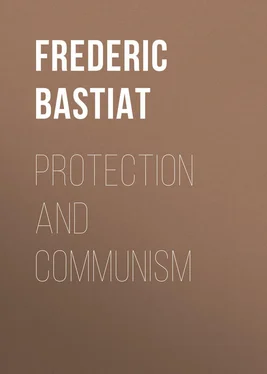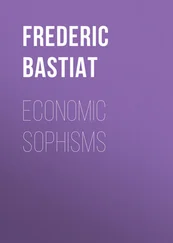Frederic Bastiat - Protection and Communism
Здесь есть возможность читать онлайн «Frederic Bastiat - Protection and Communism» — ознакомительный отрывок электронной книги совершенно бесплатно, а после прочтения отрывка купить полную версию. В некоторых случаях можно слушать аудио, скачать через торрент в формате fb2 и присутствует краткое содержание. ISBN: , Жанр: foreign_antique, foreign_prose, на английском языке. Описание произведения, (предисловие) а так же отзывы посетителей доступны на портале библиотеки ЛибКат.
- Название:Protection and Communism
- Автор:
- Жанр:
- Год:неизвестен
- ISBN:http://www.gutenberg.org/ebooks/44144
- Рейтинг книги:5 / 5. Голосов: 1
-
Избранное:Добавить в избранное
- Отзывы:
-
Ваша оценка:
- 100
- 1
- 2
- 3
- 4
- 5
Protection and Communism: краткое содержание, описание и аннотация
Предлагаем к чтению аннотацию, описание, краткое содержание или предисловие (зависит от того, что написал сам автор книги «Protection and Communism»). Если вы не нашли необходимую информацию о книге — напишите в комментариях, мы постараемся отыскать её.
Protection and Communism — читать онлайн ознакомительный отрывок
Ниже представлен текст книги, разбитый по страницам. Система сохранения места последней прочитанной страницы, позволяет с удобством читать онлайн бесплатно книгу «Protection and Communism», без необходимости каждый раз заново искать на чём Вы остановились. Поставьте закладку, и сможете в любой момент перейти на страницу, на которой закончили чтение.
Интервал:
Закладка:
It is not sufficient to indicate our views by a word; they should be defined. This has been done, and I here transcribe, as a programme, the first announcement or manifesto of this association.
'When uniting for the defence of a great cause, the undersigned feel the necessity of declaring their creed: of proclaiming the de-sign, the province, the means and the principles of their association .
'Exchange is a natural right, like property. Every one who has made or acquired any article should have the option either to apply it immediately to his own use, or to transfer it to any one, whomsoever he may be, who may consent to give him something he may prefer to it in exchange. To deprive him of this power when he makes no use of it contrary to public order or morality, and solely to gratify the convenience of another, is to legalise a robbery – to violate the principle of justice.
'Again, it is to violate the conditions of social order – for what true social order can exist in the midst of a community, in which each individual interest, aided in this by law and public opinion, aims at success by the depression of all the others?
'It is to disown that providential superintendence which presides over human affairs, and made manifest by the infinite variety of climates, seasons, natural advantages and resources, benefits which God has so unequally distributed among men to unite them by commercial intercourse in the ties of a common brotherhood.
'It is to retard or counteract the development of public prosperity, since he who is not free to barter as he pleases, is not free to select his occupation, and is compelled to give an unnatural direction to his efforts, to his faculties, to his capital, and to those agents which nature has placed at his disposal.
'In short, it is to imperil the peace of nations, for it disturbs the relations which unite them, and which render wars improbable in proportion as they would be burdensome.
'The association has, then, for its object Free-trade.
'The undersigned do not contest that society has the right to impose on merchandise, which crosses the frontier, custom dues to meet national expenses, provided they are determined by the consideration of the wants of the Treasury alone.
'But as soon as a tax, losing its fiscal character, aims at the exclusion of foreign produce, to the detriment of the Treasury itself, in order to raise artificially the price of similar national products, and thus to levy contributions on the community for the advantage of a class, from that instant Protection, or rather robbery, displays itself, and this is the principle which the association proposes to eradicate from the public mind, and to expunge from our laws, independently of all reciprocity, and of the systems which prevail elsewhere.
'Though this association has for its object the complete destruction of the system of protection, it does not follow that it requires or expects such a reformation to be accomplished in a day, as by the stroke of a wand. To return even from evil to good, from an artificial state of things to one more natural, calls for the exercise of much prudence and precaution. To carry out the details belongs to the supreme power – the province of the association is to propagate the principle, and to make it popular.
'As to the means which the association may employ to accomplish its ends, it will never seek for any but what are legal and constitutional.
'Finally, the association has nothing to do with party politics. It does not advocate any particular interest, class or section of the country. It embraces the cause of eternal justice, of peace, of union, of free intercourse, of brotherhood among all men – the cause of public weal, which is identical in every respect with that of the public consumer .'
Is there a word in this programme which does not show an ardent wish to confirm and strengthen, or rather perhaps to re-establish, in the minds of men the idea of property, perverted, as it is, by the system of Protection? Is it not evident that the interest of commerce is made secondary to the interest of society generally? Remark that the tariff, in itself good or evil in the financial point of view, engages little of our attention. But, as soon as it acts intentionally with a view to Protection, that is to say, as soon as it develops the principle of; spoliation, and ignores, in fact, the right of property, we combat it, not as a tariff, but as a system. It is there , we say, that we must eradicate the principle from the public mind, in order to blot it from our laws. 3 3 As Mr. Porter says, in one of his excellent notes on M. Bastiat's work on Popular Fallacies , 'The true history of all progress in regard to great questions, involving change in social policy, is here indicated by M. Bastiat. It is in vain that we look for such change through the enlightenment of what should be the governing bodies. In this respect, all legislative assemblies, whether called a Chamber of Deputies or a House of Commons, are truly representatives of the public mind, never placing themselves in advance, nor lagging much behind the general conviction. This is not, indeed, a new discovery, but we are much indebted to Mr. Cobden and the leading members of the Anti-Corn-Law League for having placed it in a point of view so prominent that it can no longer be mistaken. Hereafter, the course of action is perfectly clear upon all questions that require legislative sanction. This can only be obtained through the enlightenment of the constituency; but when such enlightenment has been accomplished – when those mainly interested in bringing about the change have once formed their opinion in its favour, the task is achieved.'
It will be asked, no doubt, why, having in view a general principle of this importance, we have confined the struggle to the merits of a particular question.
The reason of this, is simple. It is necessary to oppose association to association, to engage the interests of men, and thus draw volunteers into our ranks. We know well that the contest between the Protectionists and Free-traders cannot be prolonged without raising and finally settling all questions, moral, political, philosophical, and economical, connected with property. And since the Mimerel Club, in directing its efforts to one end, had weakened the principle of property, so we aimed at inspiring it with renewed vigour, in pursuing a course diametrically opposite.
But what matters it what I may have said or thought at other times? What matters it that I have perceived, or thought that I have perceived, a certain connexion between Protection and Communism? The essential thing is to prove that this connexion exists, and I proceed to ascertain whether this be so.
You no doubt remember the time when, with your usual ability, you drew from the lips of Monsieur Proudhon this celebrated declaration, 'Give me the right of labour, and I will abandon the right of property.' M. Proudhon does not conceal that, in his eyes, these two rights are incompatible.
If property is incompatible with the right of labour, and if the right of labour is founded upon the same principle as Protection, what conclusion can we draw, but that Protection is itself incompatible with property? In geometry, we regard as an incontestable truth, that two things equal to a third are equal to each other.
Now it happens that an eminent orator, M. Billault, has thought it right to support at the tribune the right of labour. This was not easy, in the face of the declaration which escaped from M. Proudhon. M. Billault understood very well, that to make the state interfere to weigh in the balance the fortunes, and equalize the conditions, of men, tends towards Communism; and what did he say to induce the National Assembly to violate property and the principles thereof? He told you with all simplicity that he asked you to do what, in effect, you already do by your tariff. His aim does not go beyond a somewhat more extended application of the doctrines now admitted by you, and applied in practice. Here are his words: —
Читать дальшеИнтервал:
Закладка:
Похожие книги на «Protection and Communism»
Представляем Вашему вниманию похожие книги на «Protection and Communism» списком для выбора. Мы отобрали схожую по названию и смыслу литературу в надежде предоставить читателям больше вариантов отыскать новые, интересные, ещё непрочитанные произведения.
Обсуждение, отзывы о книге «Protection and Communism» и просто собственные мнения читателей. Оставьте ваши комментарии, напишите, что Вы думаете о произведении, его смысле или главных героях. Укажите что конкретно понравилось, а что нет, и почему Вы так считаете.












